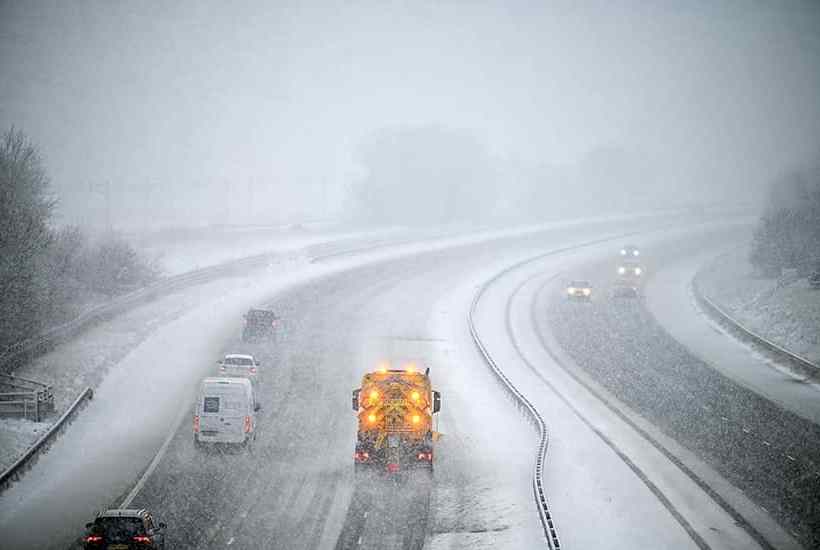If, in the days after Storm Arwen, the north of England began to suspect that the south didn’t much care about it, that suspicion has by now hardened into a cert. Many thousands of homes in the north and in Scotland still have no power and, as I write this, Storm Barra has just arrived, with a forecast of 80mph gales and eight inches of snow.
In the south, there’s excitement about the weather — ‘Man the BARRA-cades!’ — and the possibility of a white Christmas. In the north, there are elderly men and women, exhausted, hanging on, day after dismal day in the bitter dark. The village in Northumberland where I grew up has now been without electricity for 12 days. No heat, no light, no access to the news. But Northern Powergrid have laid on a fish and chip van by the village hall, between 5 and 6 p.m.
I was at home up north when Arwen hit, with four octogenarians — five if you count the spectral presence of my late godmother whom we had gathered to remember. I consider it a tribute to her that (as it turned out) we were in the actual epicentre of the storm. On Friday at about 4 p.m., I took the dog out for a walk and decided that the red weather warning was alarmist. ‘Pah,’ I said, ‘some storm’, though the dog shivered and stared blindly up at the sky like a peasant expecting divine retribution. At about 8 p.m., the dog’s point was proved. I opened the backdoor and it slammed back against the wall as if possessed. The sky seemed suddenly full of vast hurtling shapes. Then the lights blew out and the cold set in.
After 48 hours of cold and dark, my mum, my aunt and I fled south, but I’ve tracked the crisis from the guilty warmth of London. There are lessons from Arwen for any victims of Barra.
The first is not for one minute to believe the corporate PR. On Saturday 27 November, the comms people at Northern Power-grid began a vast customer expectation management exercise. ‘Hi, we are Northern Powergrid. We have just been made aware of an unplanned power cut in your area and are working hard to restore your power ASAP. With this type of power cut we normally restore your power within 90 minutes…’
That promise of deliverance receded like a mirage. Ninety minutes turned into 12 hours, then 24, then 48. But because they were told help was imminent, my uncle and aunt didn’t leave but hung on, anticipating rescue, ever hopeful that the dying freezer might be saved.
The effect of the cold is cumulative. Keeping people optimistic might stem the flow of complaints, but it’s also dangerous. All across the north, when neighbours and relatives tried to move elderly homeowners, they refused to budge. Why go when they’d been assured that it was only a matter of hours before the lights went on? No one could check with Northern Powergrid because it simply couldn’t be reached. ‘Pls ONLY call us if there is IMMEDIATE DANGER or you are MEDICALLY DEPENDENT ON ELECTRICITY,’ it texted. But I’ve heard that even people who were ‘on the priority register’ were still left in the dark.
On the Monday following Arwen, after three freezing days, the frail residents of Crosshill nursing home in Stanhope were rescued by a local fairground operator, William Henry Clark, and his son who hooked the home up to his generator. Thank God for William Henry, and for diesel.
Why wasn’t the story better covered? James Kirkup, who grew up just a few miles from me, has written for The Spectatorabout the indifference of the south to the north, but it seems to me that there’s an even more depressing answer. I wonder if our problem wasn’t just a lack of photo opportunities.
The wind was astonishing. I remember the storm of ’87, grizzled old-timer that I am, and it felt just as bad. Vast swaths of woodland fell, the sea raged, and trampolines flew through the air. But this time the most severe winds blew through the night, and there was no chance of footage. By the time my aunt and I went down to Craster harbour on Saturday to check for exciting waves, the sea was surly but undramatic. There was nothing any editor might think would make good content across social-media platforms, nothing for TikTok, which is where the kids get their news. Once you’ve seen one pine wood flattened, you’ve seen them all, I guess, and cold old people just aren’t photogenic.
Only two stories really cut through in the days after Arwen. One was about the 60 pub-goers trapped inside the Tan Hill Inn in the Yorkshire Dales. The pub people were fine, they had support and food, but they made the news because the snow was picturesque and they’d been listening to an Oasis tribute band called Noasis, so that was fun. The other was about a really fascinating criss-cross pattern the storm had made by blowing corn stalks through a wire fence.
As the days went by last week, I began to obsess over the stories the BBC homepage considered worth running. No room at the inn for the fact that some of their longest-serving licence-fee payers were freezing half to death, but top billing for the fact that pop group Little Mix were taking a break. The main news on a section called ‘Around the UK’ was the fact that a wedding ring lost in a potato patch in the 1960s had now been found. There used to be an old (half) joke about a formula used to decide what stories to run: a thousand dead in an earthquake abroad equals three drowned at home. Well here’s my news formula for the 21st-century BBC: 50,000 frozen pensioners north of Watford equal three millennials bravely opening up about their mental health and one wardrobe malfunction by a celebrity finalist on Strictly Come Dancing.
So if you hear Barra approaching, go and charge your phone. Film something amusing flying by in the stormy sky, make a TikTok; perhaps if you run a care home the residents might be persuaded to mime the lyrics from Frozen? If your power goes, there’ll be no better way to get anyone to take notice.
Got something to add? Join the discussion and comment below.
Get 10 issues for just $10
Subscribe to The Spectator Australia today for the next 10 magazine issues, plus full online access, for just $10.
You might disagree with half of it, but you’ll enjoy reading all of it. Try your first month for free, then just $2 a week for the remainder of your first year.















Comments
Don't miss out
Join the conversation with other Spectator Australia readers. Subscribe to leave a comment.
SUBSCRIBEAlready a subscriber? Log in